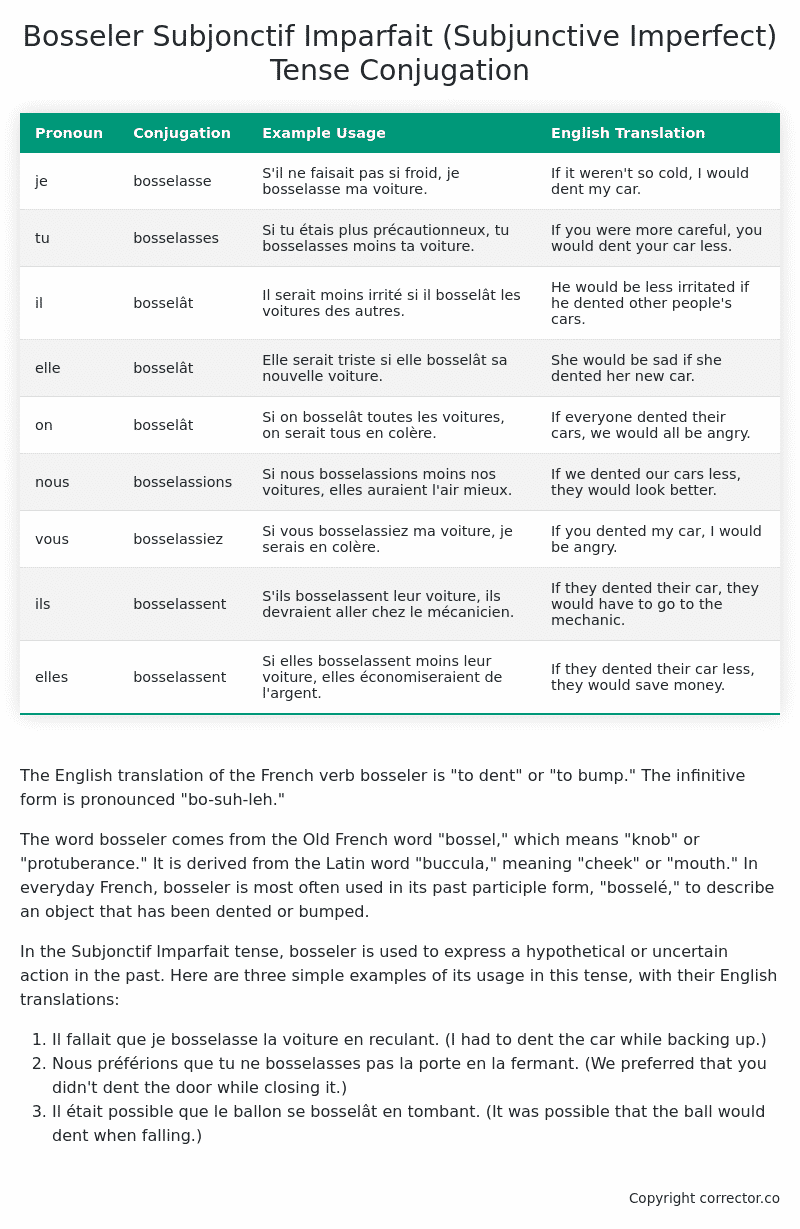Subjonctif Imparfait (Subjunctive Imperfect) Tense Conjugation of the French Verb bosseler
Introduction to the verb bosseler
The English translation of the French verb bosseler is “to dent” or “to bump.” The infinitive form is pronounced “bo-suh-leh.”
The word bosseler comes from the Old French word “bossel,” which means “knob” or “protuberance.” It is derived from the Latin word “buccula,” meaning “cheek” or “mouth.” In everyday French, bosseler is most often used in its past participle form, “bosselé,” to describe an object that has been dented or bumped.
In the Subjonctif Imparfait tense, bosseler is used to express a hypothetical or uncertain action in the past. Here are three simple examples of its usage in this tense, with their English translations:
- Il fallait que je bosselasse la voiture en reculant. (I had to dent the car while backing up.)
- Nous préférions que tu ne bosselasses pas la porte en la fermant. (We preferred that you didn’t dent the door while closing it.)
- Il était possible que le ballon se bosselât en tombant. (It was possible that the ball would dent when falling.)
Table of the Subjonctif Imparfait (Subjunctive Imperfect) Tense Conjugation of bosseler
| Pronoun | Conjugation | Example Usage | English Translation |
|---|---|---|---|
| je | bosselasse | S’il ne faisait pas si froid, je bosselasse ma voiture. | If it weren’t so cold, I would dent my car. |
| tu | bosselasses | Si tu étais plus précautionneux, tu bosselasses moins ta voiture. | If you were more careful, you would dent your car less. |
| il | bosselât | Il serait moins irrité si il bosselât les voitures des autres. | He would be less irritated if he dented other people’s cars. |
| elle | bosselât | Elle serait triste si elle bosselât sa nouvelle voiture. | She would be sad if she dented her new car. |
| on | bosselât | Si on bosselât toutes les voitures, on serait tous en colère. | If everyone dented their cars, we would all be angry. |
| nous | bosselassions | Si nous bosselassions moins nos voitures, elles auraient l’air mieux. | If we dented our cars less, they would look better. |
| vous | bosselassiez | Si vous bosselassiez ma voiture, je serais en colère. | If you dented my car, I would be angry. |
| ils | bosselassent | S’ils bosselassent leur voiture, ils devraient aller chez le mécanicien. | If they dented their car, they would have to go to the mechanic. |
| elles | bosselassent | Si elles bosselassent moins leur voiture, elles économiseraient de l’argent. | If they dented their car less, they would save money. |
Other Conjugations for Bosseler.
Le Present (Present Tense) Conjugation of the French Verb bosseler
Imparfait (Imperfect) Tense Conjugation of the French Verb bosseler
Passé Simple (Simple Past) Tense Conjugation of the French Verb bosseler
Passé Composé (Present Perfect) Tense Conjugation of the French Verb bosseler
Futur Simple (Simple Future) Tense Conjugation of the French Verb bosseler
Futur Proche (Near Future) Tense Conjugation of the French Verb bosseler
Plus-que-parfait (Pluperfect) Tense Conjugation of the French Verb bosseler
Passé Antérieur (Past Anterior) Tense Conjugation of the French Verb bosseler
Futur Antérieur (Future Anterior) Tense Conjugation of the French Verb bosseler
Subjonctif Présent (Subjunctive Present) Tense Conjugation of the French Verb bosseler
Subjonctif Passé (Subjunctive Past) Tense Conjugation of the French Verb bosseler
Subjonctif Imparfait (Subjunctive Imperfect) Tense Conjugation of the French Verb bosseler (this article)
Subjonctif Plus-que-parfait (Subjunctive Pluperfect) Tense Conjugation of the French Verb bosseler
Conditionnel Présent (Conditional Present) Tense Conjugation of the French Verb bosseler
Conditionnel Passé (Conditional Past) Tense Conjugation of the French Verb bosseler
L’impératif Présent (Imperative Present) Tense Conjugation of the French Verb bosseler
L’infinitif Présent (Infinitive Present) Tense Conjugation of the French Verb bosseler
Struggling with French verbs or the language in general? Why not use our free French Grammar Checker – no registration required!
Get a FREE Download Study Sheet of this Conjugation 🔥
Simply right click the image below, click “save image” and get your free reference for the bosseler Subjonctif Imparfait tense conjugation!

Bosseler – About the French Subjonctif Imparfait (Subjunctive Imperfect) Tense
Formation
Common Everyday Usage Patterns
Interactions with Other Tenses
Subjonctif Présent
Indicatif Passé Composé
Conditional
Conditional Perfect
Summary
I hope you enjoyed this article on the verb bosseler. Still in a learning mood? Check out another TOTALLY random French verb conjugation!


